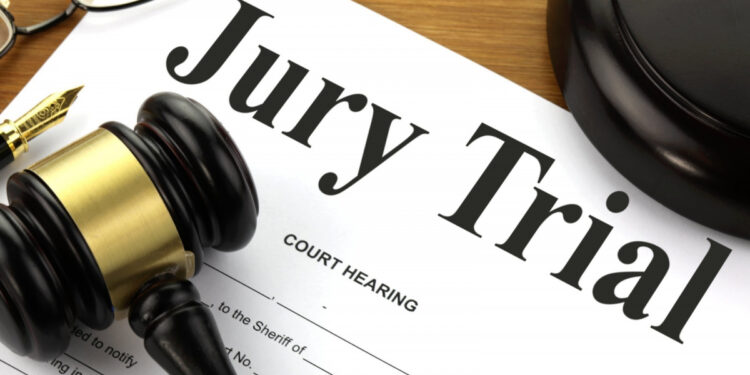Plea bargaining is, in theory, intended to serve as an integral part of our criminal legal system — rewarding those who quickly accept responsibility for their crimes with more lenient sentences, making efficient use of resources, and sparing both victims and defendants the stress of a trial.
But it too often ends up in tension with the notion of justice, punishing those who exercise their constitutional right to trial and even, at times, coercing innocent individuals to enter a plea of guilty.
This concerning “trial penalty” – the difference between the sentence attached to a plea offer versus the much greater sentence individuals often receive if convicted following a trial – prompted the recent launch of the Trial Penalty Coalition. This broad and diverse group of organizations and individuals – which includes Fair and Just Prosecution (FJP) – has united around ending these coercive and unjust practices.
As a former federal prosecutor and the executive director of FJP, I’ve seen up close how the promise of plea bargaining can break down in practice. Criminal codes are often vague, giving prosecutors wide latitude to decide what charges to file in any given case.
By filing the most serious charges that could possibly apply to the alleged conduct, “stacking” multiple charges for a single incident, and charging offenses that trigger draconian mandatory minimum sentences, prosecutors can force defendants to choose between risking a life-destroying sentence at trial or accepting a plea offer.
It hasn’t always been this way. For most of American history, jury trials served as a cornerstone of the legal system.
The right to be tried by a jury of one’s peers, enshrined in the 6th Amendment, was supposed to serve an essential role in protecting against state overreach and rooting out corruption in the justice system.
And yet, it’s a right that has become largely illusory in the context of an increasingly harsh sentencing landscape and plea bargaining that makes proceeding to trial a high-stakes gamble.
Until the 1970s, roughly 15% to 20% of federal criminal cases went to trial, and statistics in state courts were likely similar. But over the ensuing four decades, the U.S. poured trillions of dollars into policing, expanded criminal codes to outlaw a huge array of behaviors, and embraced draconian sentencing schemes, ballooning our prison population by over 600%.
The criminal legal system could not possibly bear the weight of all these new cases if a similar percentage of defendants continued to exercise their right to trial. The only way to build the infrastructure of mass incarceration without seismic investments in judges, court staff, prosecutors, public defenders, and other personnel was to apply whatever pressures were necessary to convince the vast majority of defendants to give up their right to try their case before a jury of peers.
The result is that jury trials have all but disappeared from the criminal legal system. Instead, almost all criminal convictions—about 98 percent of those in federal court and an estimated 94 percent of those in state court—are the product of guilty pleas, and data suggests that the percentage of low-level misdemeanor convictions that result from pleas is even higher.
Because plea negotiations happen behind closed doors, there’s typically no meaningful check on the prosecutor’s power. Prosecutors can force defendants to decide on plea offers before seeing the prosecution’s evidence, including evidence that might support credible defenses.
Prosecutors also have tremendous influence over whether people are jailed pre-trial, effectively forcing those who exercise their right to trial to spend months or even years in custody before they can present evidence of their innocence. And prosecutors can require those who accept plea offers to forfeit key rights, including the right to competent counsel.
Plea bargaining has even led people to plead guilty to crimes they didn’t commit. It can be hard to imagine why an innocent person would accept a plea deal, but at least 799 people—about one-quarter of all known exonerees—have been exonerated for a crime to which they pleaded guilty.
And, complicating matters further, an estimated 80% of defendants are represented by lawyers in the public defense system, which is catastrophically underfunded and understaffed; poorer defendants may reasonably question whether their lawyers have the time or resources to mount an effective defense. In many cases, the risks of going to trial are so great that the only rational choice is to plead guilty.
The concerning consequences of supplanting trials with plea bargains extend beyond individual cases. Trials bring sunlight to the criminal legal system: they force the state to defend the strength of its evidence, provide a public venue to probe allegations of government misconduct and expose procedural and systemic breakdowns. Many injustices never come to light when cases are resolved in back rooms instead of open court.
Prosecutors have significant power to correct these problems by shifting their mindset from maximizing convictions and sentences to pursuing the interests of justice.
A report released by the American Bar Association in April and an issue brief by Fair and Just Prosecution outline several ways that prosecutors can limit coercion in plea negotiations, including capping the difference between the sentences prosecutors offer in a plea and those they seek at trial, not using pretrial incarceration as a punishment for those who reject plea offers, never requiring that defendants respond to plea offers before they have had time to review the evidence against them, and never requiring that defendants waive fundamental rights as part of plea agreements.
Over the last half-century, the U.S. has embraced plea bargaining as a way of maintaining a justice system that is so massive, it leaves no room for due process. We now have a choice: we can continue chipping away at constitutional rights to make way for more prisons and punishment, or we can do what it takes to build a justice system that lives up to the promises it was founded on.
Miriam Aroni Krinsky is the executive director of Fair and Just Prosecution, a former federal prosecutor, and the author of Change from Within: Reimagining the 21st-Century Prosecutor.


























